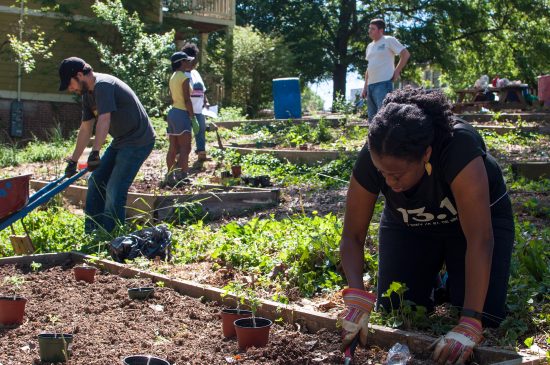Defined by Webster’s as the “Organization of a society into industrial and professional corporations serving as organs of political representation and exercising control over persons and activities within their jurisdiction”, corporatism has become ubiquitous. The bottom line for corporations is to increase shareholder value. Every day, I read about large multinational corporations skirting the law or harming consumers.
Whether it is companies like Exxon-currently under investigation about whether they knew about the role fossil fuels play in climate change-Johnson and Johnson concerning the recent ruling that their baby product may have lead to asbestos-related cancer, or Wendy’s Company refusal to sign the Fair Food Agreement,large corporations seem to care little about their consumers, the environment, or the workers they employ.
For a while, I wondered how I could avoid the worst consequences of corporatism. I pondered how could I free myself from it while helping others do the same. Of course, electing both local and federal representatives that are not funded by these same corporations and who will fight for their constituents is a factor in creating change. Likewise so is pushing for divestment from companies that engage in these negligent practices. However, there are things in your everyday life that you can do to become more self sufficient while using your consumer dollars to buy from companies that promote environmental stability and fair labor practices.
I want to share some ways I am personally becoming more self sufficient, while increasing my consumption of sustainable products from small companies in my mission to fight rampant corporatism:
Starting a garden/ Buying from local farms and co-operative grocery stores
Starting a garden has been my way to alleviate my dependence on large corporate farms for sustenance. Living in an apartment, my space is limited, but I have managed to grow a number of things on my patio to help subsidize my food budget. I learned to garden from a local gardening club, they taught me how to plant and cultivate for free. I’m learned a lot; not too long ago, I could have killed a cactus. What a change, I am now growing lettuce, bell peppers, potatoes, several types of herbs for teas and spices, and aloe in my garden.
Growing my own produce has giving me a great appreciation for my food and where it comes from, right down to the seeds. I buy from local nurseries that use all natural products to avoid the harmful pesticides large industrial farms may use in their crops. No space? Find a local farm that provides community supported agriculture (CSA) boxes, or local farmers market. Sites like Local Harvest can help you find ones near you. For those items you can’t grow or buy from local farmers, find a local grocery co-op. National Co-op grocers can help you find one near your location.
Marxist Economist Richard Wolff states that worker co-ops or worker self-directed enterprises can “replace hierarchical, top-down capitalist enterprises run by major shareholders and the boards of directors they select with a democratic enterprise directed by all its workers.” Buying from a co-op ensures you are supporting businesses that support the interests of their workers.
Incorporating minimalism / consuming from smaller shops that promote sustainable products
I escaped the rampant consuming of products mostly by accident. Some years ago, I moved to Berlin, Germany. During the move, I lost everything I owned while shipping my possessions overseas. Losing my property had a profound effect on me. It showed me that I did not need all of the stuff I had accumulated. What I lost was not that important to my new life. I never replaced most of those things, and decided to live simply. Up until recently, reducing my level of consumption was a form of protest. These days I am a proud minimalist. Quality clothes made from workers who were paid a living wage is important to me. I also buy second hand clothing, and I have learned to sew to fix hems and small tears. Buying products when you need them from smaller businesses with ties to your local communities not only helps fight corporatism, but it can help you save money, change your focus from your possessions and the empty promises advertising of these products often claim.
Change how you bank
Moving my money from a large bank to a local credit union was another key in my quest to free myself from rampant corporatism. The subprime mortgage crisis that caused the financial panic of 2008 was due largely by “too big to fail” banks. Right out of college, I remember working for one of those institutions. When things started to hit the fan, I had to listen to several customers who had lost their principal balances and had no idea how their investment worked. That left a deep scar. Not to mention, my own parents and several friends were caught in adjustable rate mortgages and lost their houses.
I grew up in the parts of Southern California that at one time had the fourth largest total number of new foreclosures in the country. Large banks also have been shown little interest in supporting the communities where their branches are located. The big four banks (JP Morgan Chase, Bank of America, Citibank and Wells Fargo) hold $5.4 trillion dollars in assets, yet have only “$85 million in small business loans on their balance sheets.” Taking your money out of these larger banks to support your local credit union can help small businesses in the long run by spurring investment in your community.
Taking steps to free ourselves from corporatism is an imperative. We must find the will to refuse participating in the wholesale destruction of the planet, our food supply, and our communities. No step is too small. Defy corporatism in every way possible, even if it means making adjustments to your lifestyle in the place of convenience. The stranglehold large corporations have over us can end with our the small decisions we make in our daily consumption habits. #VitalSelfInterest
The Ghion Journal is a reader and viewer funded endeavor. We disavow corporate contributions and depend only on the support of our audience to sustain us. The tip jar is earmarked to go directly to the writer, the link below is customized to directly to the author’s account. We thank you in advance for your kindness.



